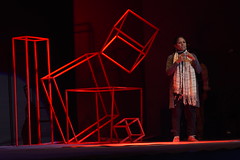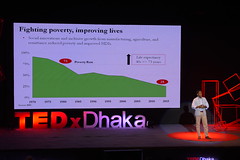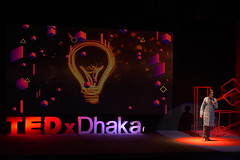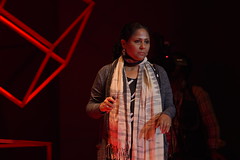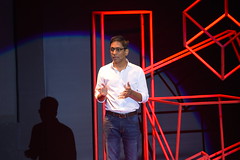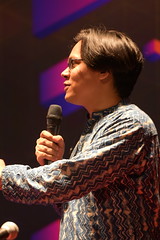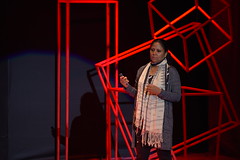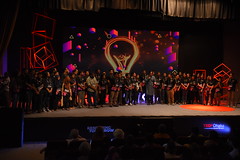Posted by Mohammad Tauheed on 09/17/13 in TEDxDhaka Blog
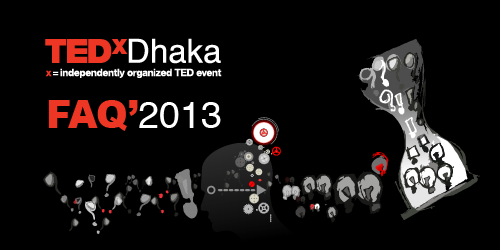
We are coming across a few frequently asked questions about the TEDxDhaka 2013: “Problems as Catalysts” event, although most of them are already answered in many of our communications still, here are some Q/A answered for your ease:
- When’s the event? How long will it run?
September 21st, Saturday, 2013. It’s a full day event. You have to clear your calendar for the entire day to attend the event. It will run from 10:30 to 18:30.
- Where’s the event?
Really?! You don’t know yet? It will happen at the International School Dhaka (ISD) Auditorium. Check out the venue page for details.
- Who are speaking?
Check out the full speaker lineup.
- What’s the theme of the event?
Speakers are always from diverse disciplines at TEDxDhaka events. However the events generally have an overall broad theme. This time it is “Problems as Catalysts”, read more...
- How long is the registration open?
As long as you can see the form in this page and it is written as ‘open’ there. Apply asap!
- Isn’t 2000 taka (25 $) a bit expensive for ticket?
To many of you, yes it is. We tried our best to keep it low and this we found as the most feasible and reasonable to our capacity. Most of our sponsors or partners are in-kind supporters, mostly they are contributing to small things directly with supplies or goodies. Since we absolutely do not allow any advertisement on stage we hardly get any cash sponsor. We do not make TEDxDhaka a place of rigorous branding but of creative outreach and thoughtful engagements. All fund of TEDxDhaka goes back to developing the event itself.
- Doesn’t TED pay for organizing TEDxDhaka?!
No. TED doesn’t pay the organizers anything. It is fully organized and funded locally and independently by unpaid volunteers, under license and following guidelines from TED.
- How do you select the attendees?
It’s neither random nor first-come-first-serve. We read every single application and decide about someone’s entry to TEDxDhaka individually. We check your ‘openness and enthusiasm’ primarily and there are a few other parameters that we determine from what you write in the form. We also try to keep a balance of diversity.
- How do you select the speakers?
We have a public nomination system open through out the year, check the Speaker Nomination Page. We also pull speakers from outside the nomination. The final selection is the Curator’s call and often based on the collective knowledge and intuition of the organizing team.
- I’m attending the event! What else should I know?
CHECK EMAILS! And you must read this PDF (Click to view).
 tag this | permalink | trackback url | comment(1)
tag this | permalink | trackback url | comment(1)
Posted by Sajid Chowdhury on 09/3/13 in TEDxDhaka Talks
“With the rise of the Internet, individuals now have unprecedented access to information. And if you are one of those lucky individuals that has access to the Internet, you are more empowered than ever before to learn almost anything you want. You are more empowered to do almost anything you want. And when so many can do anything they want, that can change everything.”
Nash’s inspiring talk highlights the power of access to information. He begins with the story of William Kamkwamba, a Malawian inventor, author, and TED Fellow. William was forced to drop out of school because his father was unable to pay school fees, which led William to a nearby library, where he learned the skills needed to create a windmill that powered appliances in his family’s home.
After William’s story was discovered, he was eventually invited to speak at TEDGlobal 2007 in Tanzania, where, for the first time, he was introduced to a world of modern technology and to the internet. “Where was this Google all the time that I needed it?!”
Nash then moves on the importance of search literacy — the ability to find information and determine good information from and information — and of the value of being auto-didactic, of being able to learn without a teacher or formal education. This is applicable not only to individuals, but to organisations, too.
Nash winds up his talk with the message that the do-it-yourself movement is here, and that it starts with you.
Nash Islam is an entrepreneur & advocate for mobile, cloud & internet as socio-economic development tools. He is the co-Founder & CEO at Mangoes Mobile, Inc., a former Google employee, and one of the core organizers of Google Business Groups, Dhaka.
 tag this | permalink | trackback url | comment(1)
tag this | permalink | trackback url | comment(1)
Posted by Sajid Chowdhury on 09/3/13 in TEDxDhaka Talks
“If we think of our identity in terms of the nation-state construct, then we have no option but to place so much emphasis on 1971, and in doing so, we risk losing sight of a much grander narrative of what it means to be Bengali. While 1971 explains why we fought for our culture and identity, it doesn’t explain where our culture and identity came from.”
Samier’s fascinating talk, given during the TEDxDhaka September 2012 event, highlights the rich, cosmopolitan, ethnically diverse, pluralistic history of the area of the world known as Bengal, which encompasses Bangladesh.
He points to major archaeological sites of Buddhist centres of learning, to some of the world’s largest rivers that flow through Bangladesh on their journey to the Bay of Bengal, and even a coin recently found in Bangladesh, dating to around 300 BC, which has its origins in Greece, as evidence of this history. In doing so, he builds a strong case for a more open, inclusive and globally engaged Bangladesh.
From the website of The Pluralism Project, which Samier initiated:
The historical remnants of this past glory remain scattered throughout the terrain of modern Bangladesh; they exist as crumbling monuments, and endure in the language, art, and culture as unifying symbols of the nation; traces of this rich and diverse history are etched upon the facial features of its citizenry. This history cannot be ignored, and by piecing these elements together, it is possible to imagine a greater role for Bangladesh in this new globalized era where integration and cooperation serve as the principle forces behind the rise of Asia, and the future social and economic order of the world.
Samier Mansur is a research scholar, columnist, and photographer.
 tag this | permalink | trackback url | comments(0)
tag this | permalink | trackback url | comments(0)
Posted by Mohammad Tauheed on 06/16/13 in TEDxDhaka Blog

TEDxDhakaLive 2013 was the first TEDxLive event showing a TED Conference live video streaming in Bangladesh. The organizing team of TEDxDhaka were a little skeptic about the success of a simulcast event at first. But after the event they had to change their mind. The event was not flawless, however we surely call it a success! The attendees loved watching TEDGlobal live and they enjoyed the time all the way including the breaks.
We hand picked the attendees and around 80-100 showed up, which is somewhat an extraordinary turnout. And they were an amazing group of people with curated majority of young students. We hosted a small workshop during a break with interested attendees about ‘how to host a TEDx event’. The target was to encourage the students from different universities in town to host TEDxUniversity events in their own campuses. It was quite an informative and interactive session with participation from all directions. It included a lot of behind the scene stories of organizing TEDxDhaka from the Organizing Team’s experiences.
The venue EMK Center helped us in every possibility. Their volunteers and crew were efficient, generous and welcoming. And thanks to EMK Center for giving us the facility for free of cost since we did not charge anything for tickets from the attendees. The Ted Cafe adjacent to the main hall sold good snacks and drinks at a very reasonable price to the attendees. The internet connection for the live streaming was supported by Qubee with a 4mbps connection. It worked moderately well with no major glitches during the live streaming. Thanks to Qubee for their generous support.
We set up a separate screen for the live #TED twitter feed. Many among the TEDxDhakaLive audience joined the global conversation on twitter while watching the talks.
The breaks were full of waving hellos to strangers from different disciplines and backgrounds sparked enthusiastic conversations about the talks and beyond.
We look forward to keep organizing this type of smaller, intimate events around the TED simulcasts in the future.
 tag this | permalink | trackback url | comment(1)
tag this | permalink | trackback url | comment(1)
Posted by Mohammad Tauheed on 05/20/13 in TEDxDhaka Blog
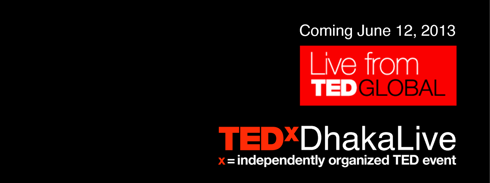
[Please note: Our main TEDxDhaka event is still scheduled for September 2013!]
For the first time we are going to host a TEDxLive event. TEDxLive events are simulcast events showing TED or TEDGlobal live on screen as it happens in main TED venues in Vancouver or Edinburgh.
This time we will show 4 sessions of TEDGlobal 2013 live from Edinburgh on June 12th, Wednesday.
We will show Session 4 to 6 running approximately 8 hours. Check out the program guide to find the details about the speakers of those sessions at TEDGlobal.
The event aims to encourage more of the students community of Bangladesh, while the rest of the community members may also join. There are ONLY 100 seats for this event with 70% allocation for students and 30% for the rest. You will hear from us by the first week of June as to whether or not you were accepted as an attendee. If selected (or not), we will confirm you over email and you will be picking up your badge on the event day at the entry.
Venue: EMK Center, Check out the VENUE page for map.
Date and time: June 12th 2013, Wednesday, starts at 13:00 local time, runs until EMK Center kicks us out!
Ticket Price: Zero. This event is free to attend.
The registration is now OPEN. Visit the Regitstration Page to submit an application online.
Thanks for your kind support and interest at TEDxDhaka. We look forward to seeing you at the event.
 tag this | permalink | trackback url | comment(1)
tag this | permalink | trackback url | comment(1)
Posted by Mohammad Tauheed on 04/12/13 in TEDxDhaka Blog
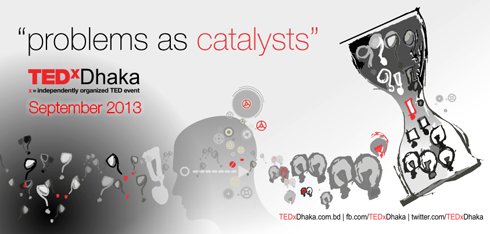
ANNOUNCING THE THEME of TEDxDhaka September 2013
“PROBLEMS AS CATALYSTS”
Most of the innovative ideas and solutions might have triggered when we fall into troubles! Often struggles push us forward to think about the innovations. Overcoming the hurdles becomes our challenge that acts as a catalyst for innovations.
Broadly at the September 2013 event we look forward to listen to those stories of how problems fueled the vehicles of thoughts, imagination and ideas. In technology, science, design, society, politics, media, everywhere we find those amazing stories of creating ground breaking panaceas which are coming out of problems in most cases.
Let’s look at our problems a little differently. Let’s embrace the inner vulnerable state of us human, for a much positive tomorrow. Let’s use what we call as problems as catalyst!
 tag this | permalink | trackback url | comment(1)
tag this | permalink | trackback url | comment(1)
Posted by Mohammad Tauheed on 03/24/13 in TEDxDhaka Blog
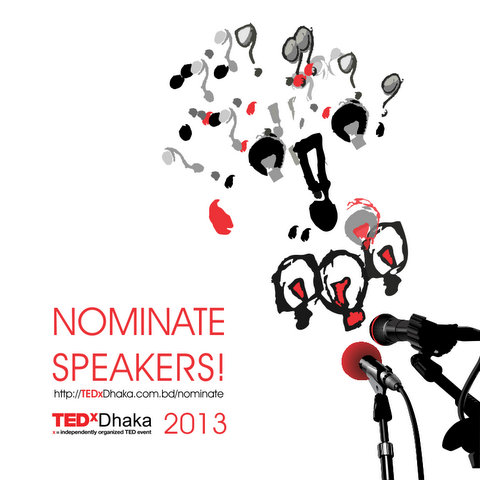
Identifying known great minds and discovering unheard of voices are the keys to have a great TEDx event. Searching for speakers is a continuous process at TEDxDhaka. And this time we look forward to YOU to help us find out outstanding potential speakers from all walks of life.
You can nominate people who you think could be perfect speakers for TEDxDhaka stage. It is best if you know the person you are nominating personally and be able to make a contact. You may also nominate yourself.
Please visit Nominate Speakers page, read everything carefully and fill in the form. Please note, we may not contact you or the nominee at all at any point.
Thanks in advance for your great contribution!
 tag this | permalink | trackback url | comments(0)
tag this | permalink | trackback url | comments(0)

 tag this
tag this



